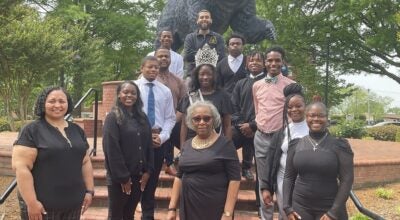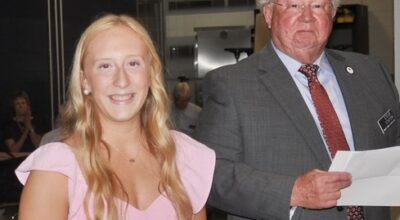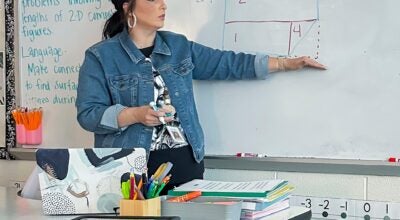First group of Noyce Scholars named at Catawba College
Published 12:00 am Thursday, December 26, 2013
Payden Mitchell of Salisbury, a junior, entered Catawba College as a Noyce Scholar this fall. An Early College student at Rowan-Cabarrus Community College (RCCC), Mitchell was one of six students who applied and received a Noyce Scholarship that offers each recipient $18,000 for their junior and senior years.
Catawba’s Noyce Scholarships are made possible thanks to a $1.45 million grant from the Robert Noyce Scholarship Program of the National Science Foundation (NSF). Scholarships provided through this program help prepare STEM (science, technology, engineering and mathematics) majors for teaching careers.
Mitchell, who is majoring in environmental education, has signed an agreement to complete his major and the teacher education program to gain licensure. He will work for two years in a high needs school district for every one year of scholarship support he receives and will complete this required service within eight years of his graduation from Catawba.
Mitchell is pleased to be a Noyce Scholar and said the financial assistance this scholarship provided “made Catawba much more affordable and assured my decision to come here.”
“I think that being a Noyce Scholar is a fantastic experience to be a part of,” Mitchell said. “It is a win/win situation for anyone looking to become an educator. It leads to great leadership and teamwork abilities as well.”
Mitchell, and two other Noyce Scholars, Ashton Pryor of Salisbury, from RCCC, and Katherine Quijada of Cooleemee, from Davidson County Community College, earned their associate degrees before entering Catawba.
Catawba’s three other Noyce Scholars this fall include Shawn Galloway of Rockwell, Sydney Hyder of Asheboro and Justin Morris of Woodleaf, all of whom entered the college as freshmen and decided to apply for the scholarship.
Pryor, a biology major, said he feels lucky to be Noyce Scholar. “I knew I wanted to study science and was leaning toward a career in education, but the Noyce Scholarship gave me the final nudge to commit.
“I advise STEM majors with no career goals to seriously consider a career in education and apply for the Noyce Scholarship. It can finance your way through school, give you opportunities for professional development, and enable you to serve your community in a very meaningful way.”
Morris, who is also a West Scholar at Catawba, considers being both a West Scholar and a Noyce Scholar “an academic award.” He is majoring in middle school education with a concentration in mathematics.
“Noyce creates a great opportunity to get started in the right direction in becoming an educator in the field of mathematics. It also has expanded my view of job opportunities as an educator in this field,” Morris explained. “The scholarship opportunity completed my financial status here at Catawba, which I am very thankful for and dearly needed.”
Noyce Scholars must maintain an appropriate GPA, make adequate progress toward degree completion by the end of the scholarship award period, participate in the programmatic events of the program, including leadership retreat, mentoring program, research internship and other professional development activities, and complete all necessary evaluations and surveys.
Noyce Scholars engage in activities that build social and cultural capital in the profession of education, providing a support network for retention and success during their training and careers in teaching. These activities include a cohort-building retreat and a mentoring program, where scholars will engage in field experiences in the classroom of a highly-effective teacher in Rowan-Salisbury Schools (RSS), to familiarize the scholar with culture of public education. The mentoring programming has the added benefit of developing a social network that supports the scholars during their induction years.
Following graduation and to support the scholars during their induction into teaching, they receive continued mentoring and financial support. As classroom teachers, Noyce Scholars receive funds to attend a state STEM education conference and to buy classroom supplies.
The NSF grant is directed by Dr. Connie Rogers-Lowery, associate professor and chair of biology at Catawba. She is delighted with the first cohort of Noyce Scholars at the college and says all targets of the grant proposal were met during a successful first year.
“Twelve students from RCCC applied, were accepted, and successfully completed paid summer internships in a STEM occupation. We had outlined in the grant proposal that we would place 12 summer interns during each of the five years of the grant,” Lowery said, praising the collaboration from the NSF grant partners at RCCC.
Dottie Moore, coordinator of work-based learning at RCCC, noted that the efforts to recruit Noyce Summer Interns on her campus would begin in March. “All of the employers where we placed summer interns last year said they would be delighted to host our students again.”
Summer internship employers for Noyce will again include Horizons Unlimited, Discovery Place, Catawba’s Center for the Environment, RCCC’s summer camps and Rowan Cooperative Extension Office.
Lowery said the original NSF grant proposal committed to six Noyce Scholars at Catawba during three years of the grant period. “We have our first cohort, and have already recruited and accepted a Catawba College student, Brinsley Stewart of Boonville, as a Noyce Scholar for our 2014-2015 cohort.”
Lowery said an online awareness survey would be emailed to Catawba STEM majors during the spring semester of 2014 to make sure these students know about the opportunities offered by a Noyce Scholarship.
In addition to Rogers-Lowery, others on the faculty team who collaborated on the grant proposal include, from Catawba, Dr. Cyndi Osterhus, who taught the education course at Catawba that all Noyce Summer Interns are required to take, and Dr. John Zerger, professor of mathematics; and from Rowan-Cabarrus, Dr. Marcy Corjay, dean of science, biotechnology, mathematics and information technologies.
The grant period began Oct. 1, 2012 and expires Sept. 30, 2017.





